
What is South Africa doing to reduce its carbon footprint?
Countries that have signed the Paris Agreement of 2016 are legally bound to reduce greenhouse gas emissions. As a signatory, South Africa has drawn up nationally determined contributions to achieving these targets by significantly reducing its emissions from the current level of 600 million tons of carbon dioxide to 200 million tons by 2050. This is a big ask for our industries.
As a result, South Africa’s government has instituted a carbon tax to try to shift the country to a low-carbon economy. The tax is based on the ‘polluter pays’ principle, and the idea is not to generate more tax, but to change behaviour.
As far as globally required tax rates go, South Africa is very far behind. The rate will have to go up nearly 2 000% to get to the required range.
How does this affect agriculture?
Agriculture is exempt from paying carbon tax until 2022, but the sector is still paying a carbon tax through fuel consumption as there is a carbon tax fuel levy in place. Eskom is also exempt until 2022, but after that they will pass the extra cost on to the consumer, which means that farmers will pay more for their electricity.
The first step that farmers should take is to start reducing their dependency on fossil fuel energy. They should then focus on all the chemicals they use and the process of converting indigenous bush to cultivated lands. The annual carbon emissions from a typical South African fruit farm are 7t/ha/year; this includes fuel, electricity, fertiliser, agrochemicals and land-use change. Once carbon taxes for agriculture come into force in 2022, farmers can expect to pay about R1 200/t, which equates to R252 000 for a 30ha farm.
This story is from the December 13, 2019 edition of Farmer's Weekly.
Start your 7-day Magzter GOLD free trial to access thousands of curated premium stories, and 8,500+ magazines and newspapers.
Already a subscriber ? Sign In
This story is from the December 13, 2019 edition of Farmer's Weekly.
Start your 7-day Magzter GOLD free trial to access thousands of curated premium stories, and 8,500+ magazines and newspapers.
Already a subscriber? Sign In
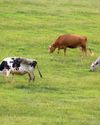
Africa goes from net carbon sink to source
New research shows Africa's impact on greenhouse gases and the need to focus on climate-smart agriculture
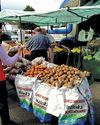
Ireland potato farmers unable to complete planting
Irish potato farmers have reported a delay in harvest and said that the UK might have to prepare for shortages of the produce. The shortfall is due to extreme wet weather during their planting season.
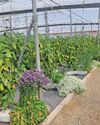
Zero-residue fresh produce a reality
Retail giants are calling for caution when using biologicals and chemical pesticides,

Big boost for mohair producers in Eastern Cape
A collaboration between the Eastern Cape Development Corporation (ECDC) and the Mohair Empowerment Trust (MET) has resulted in a R1,4 million injection into four emerging Angora goat farming operations in the Eastern Cape.

KZN Youth Show at Roval Agricultural Exhibition
The KZN Youth Show will run from Friday, 24 May to Sunday, 26 May at the Royal Showgrounds in Pietermaritzburg.
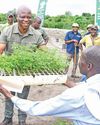
Hemp permits and irrigation system handed over
In an effort to fast-track the entry of rural farmers into the cannabis and hemp industries, KwaZuluNatal Minister for Agriculture and Rural Development, Super Zuma, visited the Shukasibheme Project in Mbazwana, a co-operative in Mseleni, uMhlabuyalingana in the Umkhanyakude District, to hand over cannabis and hemp permits as well as a borehole and irrigation system.

Meet some of the heroes behind avitourism destinations
Exploring what the Garden Route offers birdwatchers, Brian Berkman discovers some special people who run hospitable places to meet and see a variety of species.

What the Citrus Academy offers aspiring producers
Cobus du Plessis takes a look at the Citrus Growers' Association of Southern Africa's Citrus Academy and how it is helping to develop aspiring farmers in the sector.

Natural-born killers of the insect world
The Myrmeleontidae family of lacewings from the Neuroptera order of insects consists of about 2 000 species of which 125 are found in South Africa.
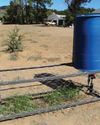
Seeder kick-starts vegetation in challenging environments
Dr George Craven of Noorspoort, Steytlerville, in the south-eastern Karoo, is successfully using a home-built 'bedstead seeder' to re-establish veld plants in an arid area, writes Roelof Bezuidenhout.